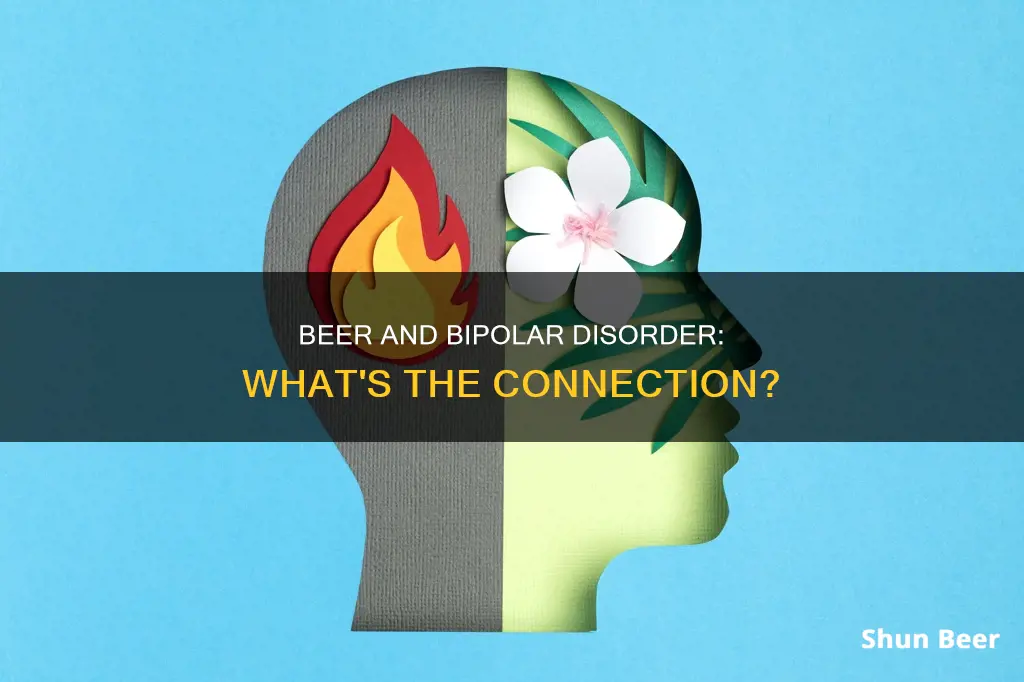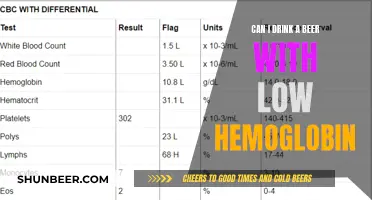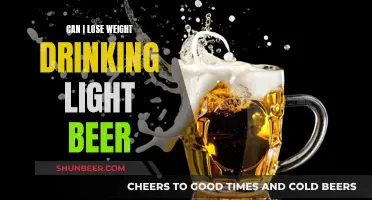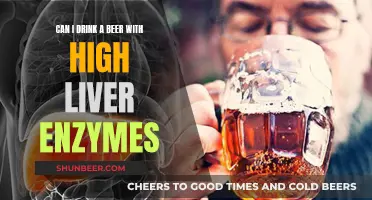
Alcohol and bipolar disorder are linked, with a high percentage of people with bipolar disorder also suffering from alcohol use disorder. Alcohol can negatively impact bipolar disorder in several ways: it can increase the severity of symptoms, interfere with medication, and make treatment more difficult. However, it can also act as a social lubricant, helping individuals with bipolar disorder to socialise and build relationships. Ultimately, the decision to drink or not drink with bipolar disorder is a personal one and depends on various factors, including medication and individual responses to alcohol.
| Characteristics | Values |
|---|---|
| Bipolar Disorder Prevalence | 4.4% of adults in the US |
| Alcohol Use Disorder Prevalence | 45% of people with bipolar disorder |
| Alcohol Impact on Bipolar Disorder | Amplifies mood shifts, increases severity of symptoms, increases risk of complications, interferes with medication |
| Alcohol and Bipolar Disorder Treatment | Alcohol can complicate treatment, increase risk of misdiagnosis, and hinder recovery |
| Alcohol as a Coping Mechanism | Alcohol can be used to self-medicate and manage symptoms, but it avoids healthy coping mechanisms and recovery |
| Risk of Developing Alcohol Use Disorder | Higher for people with bipolar disorder due to impulsivity, risky behaviour, and mania |
| Alcohol and Mania | Alcohol lowers inhibitions, triggering poor judgment, self-destructive behaviours, and impulsive behaviour |
| Alcohol and Depression | Alcohol is a CNS depressant that can increase the risk of lethargy and further reduce inhibitions |
| Alcohol and Psychosis | Combining alcohol with psychosis increases the risk of mental and physical complications |
| Alcohol and Medication | Alcohol can interfere with bipolar medications, causing unpleasant or dangerous side effects |
What You'll Learn

Alcohol and bipolar disorder: a complex relationship
Bipolar disorder is a mental illness that causes cycling between manic and depressive moods. It affects around 4.4% of people in the United States at some point in their lives. The effects of bipolar disorder vary between individuals and according to the phase of the disorder that the person is experiencing.
Alcohol use disorder commonly co-occurs with bipolar disorder, with up to 45% of individuals with bipolar disorder also engaging in alcohol abuse. This correlation is complex and multifaceted. Firstly, individuals with bipolar disorder are at a heightened risk of developing a substance abuse disorder due to their impulsive nature and tendency to engage in high-risk behaviour. Secondly, alcohol can exacerbate the symptoms of bipolar disorder, increasing the severity of manic and depressive episodes and the risk of complications such as suicide. Thirdly, alcohol may interfere with bipolar medications, such as lithium and valproic acid, reducing their effectiveness or causing dangerous side effects. Finally, alcohol can hinder recovery by providing a means of self-medication that prevents individuals from finding healthy coping mechanisms and addressing their underlying issues.
However, the decision to consume alcohol is a personal one, and some individuals with bipolar disorder report being able to drink in moderation without adverse effects. It is important to consult a doctor or therapist for personalized advice, as individual experiences vary.
Beer and Axes: Is It Safe to Mix?
You may want to see also

Alcohol misuse and bipolar disorder: causes and consequences
Bipolar disorder is a mental illness that causes cycling between manic and depressive moods. It affects around 4.4% of US adults at some point in their lives. Bipolar disorder is believed to result from imbalances in brain chemistry, with a genetic component also thought to be involved.
Alcohol use disorder (AUD) commonly co-occurs with bipolar disorder. A 2013 review found that about 45% of people with bipolar disorder also have AUD. The combination of these two disorders can have severe consequences if left untreated, with people experiencing more severe bipolar symptoms and a higher risk of dying by suicide.
Several factors may explain the link between bipolar disorder and alcohol misuse. One theory is that people with bipolar disorder use alcohol to manage their symptoms, especially during manic episodes. Alcohol is a central nervous system (CNS) depressant that can help people relax. However, it can also reduce inhibitions and trigger poor judgment and self-destructive behaviours. Manic episodes associated with bipolar disorder can also lower inhibitions and lead to impulsive behaviour, and when combined with alcohol, this can result in dangerous consequences.
Another theory is that there are genetic links between bipolar disorder and AUD. Family history is a risk factor for both conditions, suggesting that certain genes may contribute to both. However, it is important to note that having a family member with one or the other does not guarantee that an individual will develop either disorder.
Alcohol use can also negatively impact bipolar disorder symptoms and increase the risk of complications. It can exaggerate symptoms of both mania and depression, and increase the severity of bipolar disorder overall. Alcohol can also interfere with bipolar medications, such as lithium and valproic acid, and cause unpleasant or dangerous side effects.
Treating both bipolar disorder and AUD is essential for effective management. Treatment for AUD is most effective when all needs are addressed, including the presence of bipolar disorder or other co-occurring disorders. Residential treatment programs can be beneficial as they provide a safe and comprehensive environment for addressing all issues. Treatment typically involves a combination of medications and therapy, along with supplemental treatments such as holistic care and creative therapies.
While it can be challenging to manage bipolar disorder and give up alcohol, it is important to seek help as soon as possible. Treatment is effective and can help individuals with co-occurring disorders lead healthier lives.
Drinking Beer on Chicago Streets: What's the Law?
You may want to see also

Alcohol's impact on bipolar disorder symptoms
Alcohol can have a significant impact on bipolar disorder symptoms, and this impact can vary depending on the individual and the phase of the disorder they are experiencing. Here are some ways in which alcohol can affect bipolar disorder:
Exaggerating Symptoms
Alcohol can exaggerate the symptoms of both mania and depression. During a manic phase, alcohol consumption can further reduce inhibitions, leading to impulsive behaviour. This can include overindulging in alcohol consumption itself, creating a cycle of excessive drinking. During a depressive phase, alcohol, as a central nervous system depressant, can increase the risk of lethargy and make symptoms of depression worse.
Complicating Treatment
Bipolar disorder is often treated with medication, and alcohol may interfere with the effectiveness of these medications. For example, valproic acid, a central nervous system depressant, can have similar effects to alcohol, and using both together can increase the effect, leading to potentially serious consequences. Alcohol can also cause dehydration, which can lead to toxic levels of lithium in the body.
Increasing Risk of Complications
Alcohol use can increase the risk of complications from bipolar disorder. This includes an increased risk of suicide, which is a serious complication of the disorder. Alcohol consumption can also complicate the treatment of psychosis, which can occur during a manic phase. Combining alcohol with psychosis increases the risk of mental and physical complications.
Triggering Symptoms
Alcohol use may also trigger symptoms of bipolar disorder or make them more severe. This is especially true for those who are already at risk due to factors such as family history. Alcohol use can also trigger symptoms of mania or depression during withdrawal from alcohol dependence.
Impacting Diagnosis
Alcohol misuse can also lead to a misdiagnosis of bipolar disorder, as the symptoms of alcohol misuse can overlap with those of bipolar disorder. This can make it more difficult for doctors to identify the correct diagnosis, leading to a delay in receiving proper treatment.
In conclusion, alcohol can have a significant impact on bipolar disorder symptoms and can worsen the condition. It is essential for individuals with bipolar disorder to be cautious about alcohol consumption and to seek professional advice if they have concerns about their drinking habits.
Beer and Orajel: A Safe Mix?
You may want to see also

Alcohol and bipolar medication: interactions and side effects
Bipolar disorder is a mental health condition that involves extreme mood swings, from emotional highs (mania or hypomania) to emotional lows (depression). People with bipolar disorder are at a high risk of developing a substance abuse disorder, with up to 45% of individuals with bipolar disorder also engaging in alcohol abuse.
Alcohol can negatively impact individuals with bipolar disorder in several ways. Firstly, it can increase the severity of bipolar symptoms, making individuals more violent, impulsive, and likely to engage in substance abuse. Secondly, it can negatively interact with bipolar medications, worsening side effects such as drowsiness, dizziness, memory impairment, confusion, and poor judgment. This additive drowsiness can be dangerous when performing tasks that require concentration, such as driving or operating machinery.
Additionally, alcohol can reduce the effectiveness of bipolar medications. It can interfere with how the medication is absorbed in the digestive tract, or it can increase the concentration of the medication in the blood to toxic levels. Alcohol can also make the side effects of certain medications worse or even cause new symptoms.
For individuals taking bipolar medication, it is generally best to avoid alcohol consumption. If you drink alcohol frequently, it is important to discuss this with your doctor and review each medication for potential interactions.
Drinking Beer Legally in Dry Counties: What's Allowed?
You may want to see also

Treating bipolar disorder and alcohol use disorder
Bipolar disorder and alcohol use disorder (AUD) are two serious mental health conditions that often co-occur. About 45% of people with bipolar disorder also struggle with AUD, and this combination can have severe consequences if left untreated. People with both conditions tend to experience more severe bipolar symptoms and are at a higher risk of dying by suicide.
While researchers have not identified a clear link between the two disorders, there are several theories that attempt to explain the connection. One theory suggests that AUD may trigger bipolar disorder, although there is no scientific evidence to support this idea. Another theory posits that bipolar disorder and AUD may share genetic risk factors, as family history is a risk factor for both conditions.
Treating bipolar disorder and AUD simultaneously is essential for effective management. Doctors often diagnose and treat these disorders separately, which can lead to incomplete treatment for individuals with both conditions. There are three main strategies for treating bipolar disorder and AUD:
- Treat one condition first and then the other: Typically, AUD is addressed first as it is considered more pressing.
- Treat both conditions separately but concurrently: This approach involves addressing each disorder with specific treatments.
- Combine treatments and address the symptoms of both conditions together: Many people consider this to be the best method, although there is limited research on how to combine treatments effectively.
For bipolar disorder, medication and individual or group therapy have proven effective. Treatment options for AUD include 12-step programs and cognitive behavioural therapy.
It is important to note that alcohol can increase the sedative effects of mood stabilizers used to treat bipolar disorder, which can be dangerous. Therefore, seeking professional help and consulting with a doctor or therapist about treatment options is crucial for managing both conditions successfully.
Exploring Green Lanes: Beer and Beyond
You may want to see also
Frequently asked questions
It is best to approach alcohol with caution when living with bipolar disorder. Alcohol can influence medication effectiveness, trigger symptoms, and exacerbate mood episodes.
Alcohol can exaggerate symptoms of both mania and depression. During a manic phase, alcohol consumption can lead to impulsive behaviour and a higher risk of engaging in reckless behaviour. During a depressive phase, alcohol can increase the risk of lethargy and further reduce inhibitions.
People with bipolar disorder may turn to alcohol as a form of self-medication to cope with their symptoms and mood changes. Alcohol can numb the pain and make life feel easier, but only for a moment.
Drinking alcohol with bipolar disorder can increase the severity of symptoms and the risk of complications. It may also interfere with bipolar medications and trigger recurrences of mental health symptoms.







